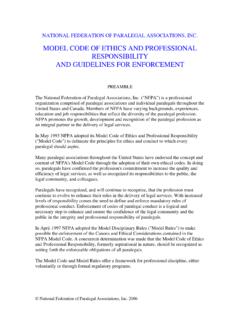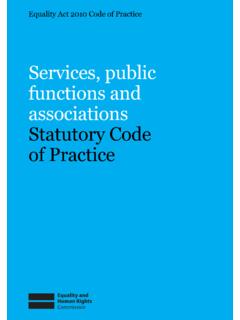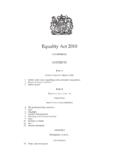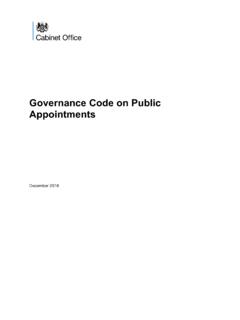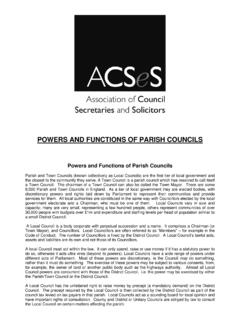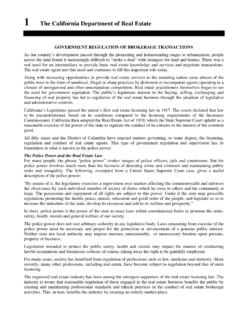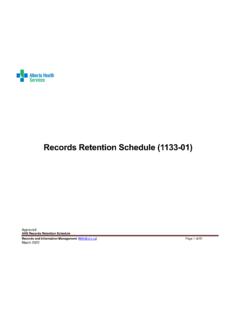Transcription of Paralegal Responsibilities
1 Paralegal Responsibilities Table of Contents INTRODUCTION National Federation of Paralegal Associations Who is a Paralegal ? Where It All Began Contents of This Publication SPECIALTY PRACTICE AREAS Administrative Law Alternative Dispute Resolution (ADR) Appellate Asbestos Litigation Bankruptcy Business/Corporate Collections Commercial Litigation and Collection Computer Litigation Support Construction Contract Administration Domestic Relations/Family Law Employee Benefits Criminal Environmental Law Estates & Trust Administration Immigration Intellectual Property Labor/Employment Landlord/Tenant Litigation Personal Injury/Medical Malpractice/Product Liability public Benefits Real Property Securities/Municipal Bonds Tax Workers' Compensation RELATED CAREERS Paralegal Management/Administration
2 ROLES AND Responsibilities INTRODUCTION NATIONAL FEDERATION OF Paralegal ASSOCIATIONS The National Federation of Paralegal Associations, Inc. (NFPA ) was created in 1974 to assist the Paralegal profession in building a communications network and to provide direction for future development. It is NFPA s intent to provide the necessary foundation from which paralegals may expand their roles in the future. NFPA has grown to more than 50 associations, located throughout the United States, Great Britian and to approximately 10,000 members.
3 This membership reflects a broad diversity of experience, education and job Responsibilities . Throughout its history, NFPA has recognized and met its commitment to examine issues and explore new and innovative means by which legal services at moderate cost may be made more generally available. NFPA continues to assist the profession in verifying and expanding the role of the paralegals, and continues to respond to issues and events from professional legal organizations and other groups. It is NFPA s intent to provide the necessary foundation from which paralegals can expand their roles in the future.
4 WHO IS A Paralegal ? Paralegals are educated and well trained with a variety of backgrounds, experience, education, and job Responsibilities working across a broad range of practice areas. Only statutory , court authority or a supervising attorney's determination of the Paralegal 's competency limits the tasks a Paralegal may perform. Paralegals perform the same functions as an attorney except those generally prohibited by unauthorized practice of law statutes, , accepting clients, setting legal fees, giving legal advice, or representing others in court.
5 The delivery of legal services by non-lawyers before many federal administrative agencies is a well-established fact. Because the law is complex and often ambiguous, paralegals must be intelligent and possess an analytical and logical mind. They must be able to recognize and evaluate relevant facts and legal concepts. Paralegals have the ability to organize, analyze, communicate, and administer. Interpersonal skills that serve paralegals include resolving conflicts, negotiating, and relating well with various types of persons, often when these persons are in distress.
6 Education plays a vital role in the development of the Paralegal profession. Although on-the-job training remains an important element in developing successful paralegals, formal education has an increasingly important role. In recognizing a two-year degree and recommending a four-year degree, NFPA has taken the lead in providing the profession with the necessary tools to prepare for its future role in the delivery of legal services . Education does not stop with completion of a formal study; through continuing education, paralegals expand their knowledge base, thus increasing their ability to perform more challenging tasks.
7 NFPA believes that paralegals should uphold a high level of ethical standards. After conducting extensive research and obtaining comments from individuals with expertise in the area of ethics, in May 1993, NFPA created and adopted a Model Code of Ethics and Professional Responsibility ( Model Code ). The Model Code provides paralegals with ethical guidelines and standards for professional conduct to which all paralegals should aspire. Through its Ethics Board, NFPA provides opinions and information in response to inquiries about ethical actions and activities.
8 In 1997, the Copyright 2006-2011 National Federation of Paralegal Associations, 1 NFPA adopted the Model Code of Ethics and Professional Responsibility and Guidelines for Enforcement. WHERE IT ALL BEGAN The Paralegal /lay advocacy movement has its roots in the 1960s when formal programs were started in public service agencies for the purpose of training individuals to assist in making legal services available to those unable to pay for legal services . Private law firms, businesses, and governmental agencies quickly recognized the benefits of employing specially trained individuals to provide services at lower billing rates, benefiting the client and increasing efficiency.
9 Since its inception, the Paralegal profession has consistently experienced growth, both in the number of paralegals practicing and in the type and level of Responsibilities . In the early 1980s, courts began to recognize that paralegals were separate from support staff and encouraged attorneys to provide legal services in the most efficient manner possible. As paralegals became more integrated into the legal team and the work delegated to paralegals became more substantive in nature, attorneys began to include time for both attorney and Paralegal services in fee petitions as permitted by state or federal statutes.
10 Courts awarding fees for Paralegal services consistently point out that if the work had not been done by paralegals, charging fees based upon attorneys' rates would have been necessary. Recognizing the need to make legal services more widely available to the general public , paralegals have expanded their practice into many broad and diverse specialties. The demand for expertise has led many paralegals to develop knowledge and skills in highly technical or specialized subject areas. Paralegals differ in their backgrounds, experience, training, and Responsibilities .


